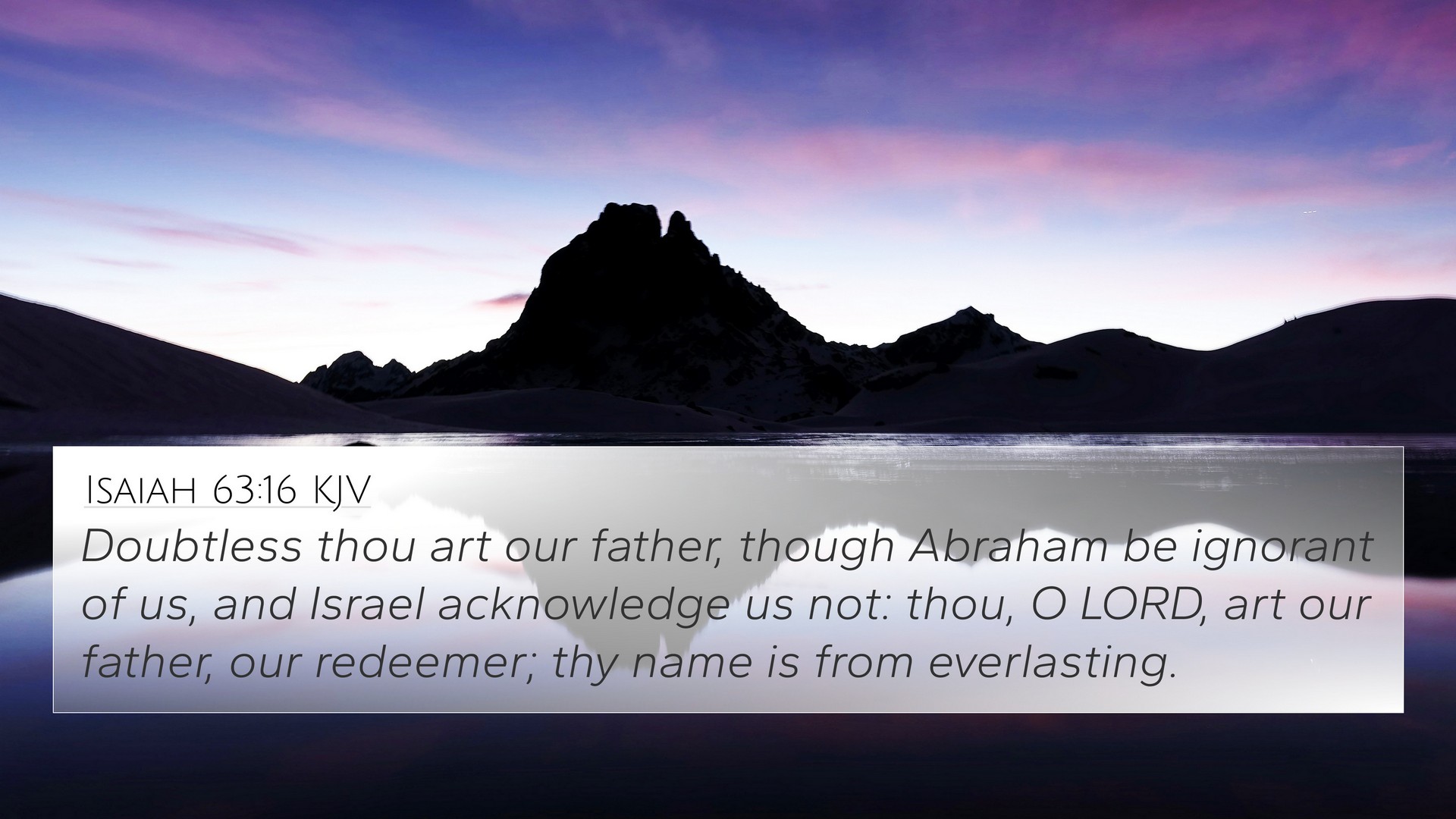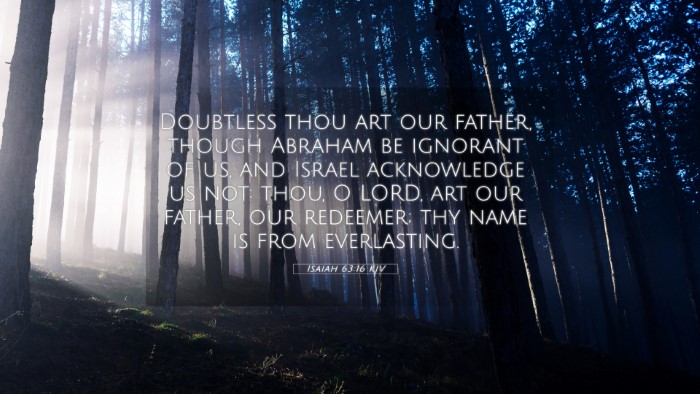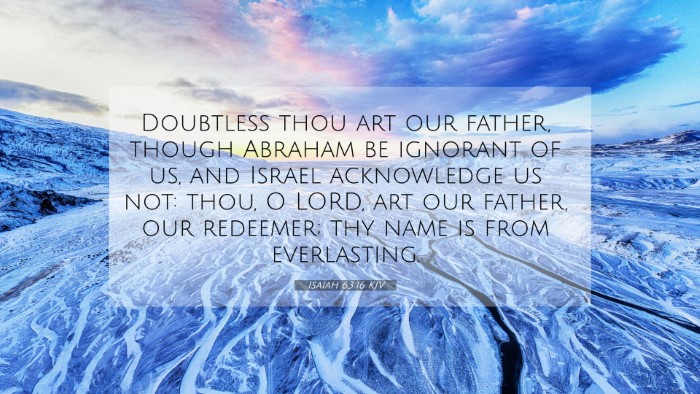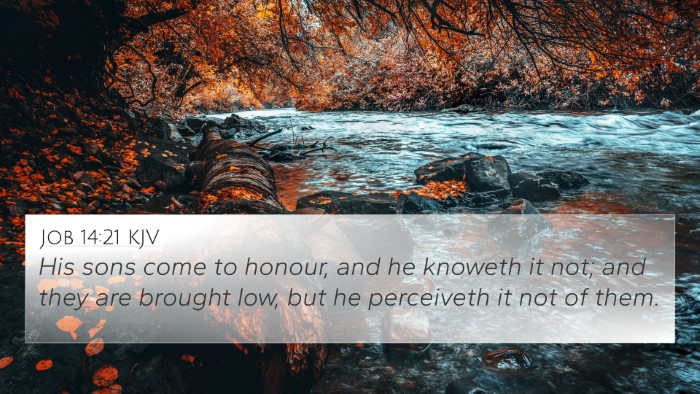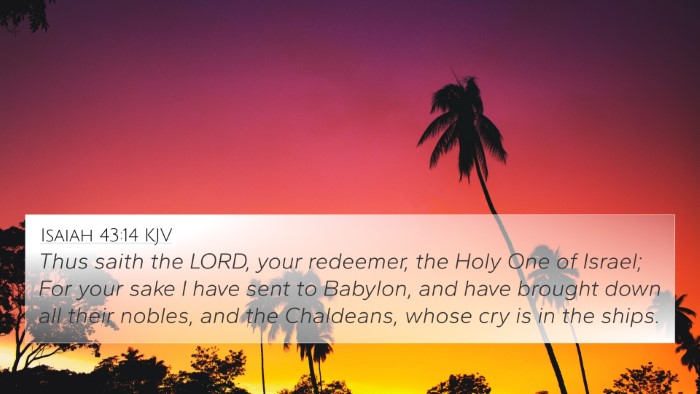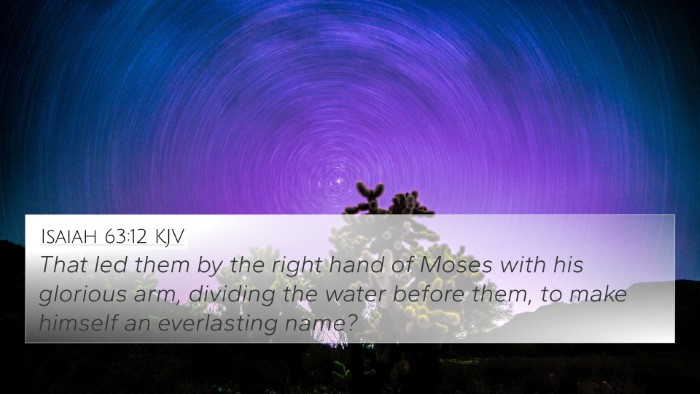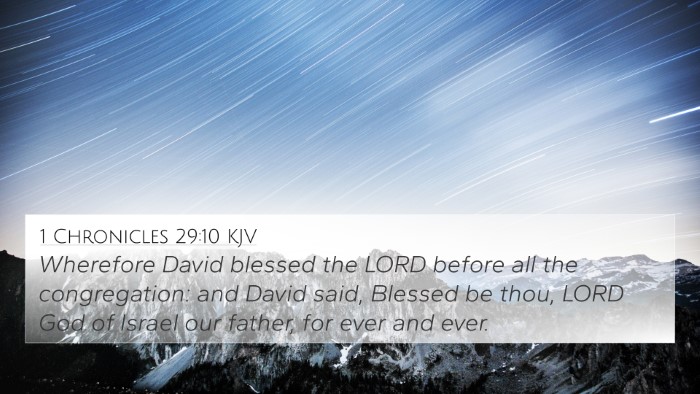Isaiah 63:16 states:
"Doubtless you are our father, though Abraham was ignorant of us, and Israel acknowledges us not: you, O Lord, are our father, our redeemer; your name is from everlasting."
The verse holds profound significance reflecting on themes of fatherhood, redemption, and God's eternal nature. Here is an interpretation based on public domain commentaries from Matthew Henry, Albert Barnes, and Adam Clarke.
Meaning and Interpretation
This verse reflects a deep sense of relational identity between God and His people. The prophets remind the Israelites that God, their Redeemer, acts as a father despite their historical disobedience and neglect.
Key Themes
- God as Father: The reference to God as 'our Father' emphasizes His protective and guiding role. Matthew Henry notes that the acknowledgment of God as a father is essential for understanding the intimate relationship He desires with His creation.
- Abraham and Israel: The contrast drawn between God's awareness of His people and the ignorance of Abraham and Israel highlights God's constant watching over and caring for His people. Albert Barnes suggests this illustrates the faithful yet often forgotten recognition of God's sovereignty among even the patriarchs.
- Redemption: The term 'redeemer' signifies God's act of saving His people from their sin and misery. Adam Clarke elaborates that this was a pivotal assertion of God's ongoing work of salvation throughout history, extending beyond the constraints of human acknowledgment.
- Eternity of God: The phrase 'Your name is from everlasting' acknowledges the eternal nature of God. This assertion reminds believers of His unchanging quality amidst a world that changes constantly. Henry emphasizes that God's eternal nature reassures His people of His unyielding support.
Comparative Analysis with Other Scriptures
This verse offers rich opportunities for cross-referencing with other Biblical texts, enhancing the understanding of relational themes within the Scriptures. Key cross-references include:
- Exodus 3:6: "Moreover he said, I am the God of your father, the God of Abraham, the God of Isaac, and the God of Jacob..." - Reinforces God's identity as a family figure to His people.
- Romans 8:15: "For you did not receive a spirit of bondage again to fear, but you received the Spirit of adoption by whom we cry out, 'Abba, Father.'" - Affirms believers' new identity in Christ.
- Isaiah 64:8: "But now, O Lord, You are our Father; We are the clay, and You our potter; And all we are the work of Your hand." - Continues the theme of divine fatherhood and the relationship between Creator and creation.
- Galatians 4:6: "And because you are sons, God has sent forth the Spirit of His Son into your hearts, crying out, 'Abba, Father!'" - Further links the themes of inheritance and belonging to the family of God.
- John 1:12: "But as many as received Him, to them He gave the right to become children of God, to those who believe in His name." - Highlights the access granted to believers through faith.
- Psalms 103:13: "As a father pities his children, so the Lord pities those who fear Him." - Reflects the compassionate nature of God as a caregiver.
- Hebrews 12:9: "Furthermore, we have had human fathers who corrected us, and we paid them respect. Shall we not much more readily be in subjection to the Father of spirits and live?" - Compares earthly fatherhood with divine guidance and discipline.
Exploring Inter-Biblical Connections
In understanding Isaiah 63:16, it begins to weave a thematic tapestry of God’s enduring love and omnipotence across the Bible.
This thematic exploration reveals several inter-Biblical dialogues, enabling believers to grasp deeper insights into their faith and God's continuous engagement with humanity.
- Thematic Bible verse connections: The mention of God’s fatherhood links to many scriptures illustrating His loving nature, emphasizing the accessibility of God's presence.
- Bible verse parallels: Connections can be drawn between Old Testament prophets and New Testament revelations, portraying a consistent divine message.
- Cross-referencing Psalms with New Testament teachings: For example, the messages in Psalms that invoke trust in God's fatherly nature resonate with teachings found in the Gospels.
Conclusion
Isaiah 63:16 offers a profound theological foundation examining God’s relationship with His people. It stresses the essence of redemption, divine fatherhood, and God's eternal power. Through comparative Bible verse analysis and utilizing tools for Bible cross-referencing, believers can uncover the rich layers of meaning present in this verse and its significant role in the broader narrative of Scripture.
In summary, understanding Isaiah 63:16 can deepen one's relationship with God, illustrating the importance of recognizing His unwavering presence and the powerful lineage of faith that connects believers through time.
Resources for Further Study
- Bible concordance for locating verses and connections.
- Bible cross-reference guide for exploring relationships between verses.
- Comprehensive Bible cross-reference materials to enhance personal study.
- Tools for Bible cross-referencing to facilitate in-depth scriptural analysis.
- Cross-referencing Bible study methods to uncover deeper meanings.
